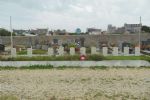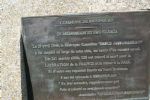HMCS Athabaskan Memorial
- 12
- See on map
Commemorative plaque unveiled on May 6, 2017.
On April 29, 1944, at around 3 a.m., the Athabaskan patrolled with her sister-ship, the destroyer Haida, in support of a British mine-laying operation off the coast of France near the mouth of the Morlaix River. She receives the first in a series of orders from the Admiralty to intercept German warships near Batz Island spotted by coastal radar in southern England.
During the naval confrontation between the Allied flotilla and two German torpedo boats, the T27 and T24, it was sunk off the Île Vierge lighthouse. The sinking caused the death of 128 sailors, 44 of whom were rescued by the Haida and 83 were taken prisoner by three German minesweepers that left the coast after the Haida's departure. The T27 was also lost in the battle and ran aground near Kerlouan. The bodies of 60 sailors were buried in the Plouescat cemetery military plot.
Jean Postec, a farmer in Plouescat, testifies: "During the night of April 28 to 29, I was awakened by powerful explosions from the open sea. Early in the morning, I went to Menfig beach to see what had happened, and witnessed a dramatic scene. The sea is black with oil and strewn with dozens of bodies and debris. Some of the survivors try to make their way ashore through the current and the oil patches. I try to give as much help as I can to the shipwrecked crew, helping them to remove their buoys and oil-black clothes, and bringing the lifeless bodies to the sand. Terribly marked by this day, I'm taking these life jackets home with me, in memory of the sinking of the Canadian destroyer HMCS Athabascan, and of all those poor sailors in distress."
Source wikipedia
Contribution and photo credit Philippe Boudot




